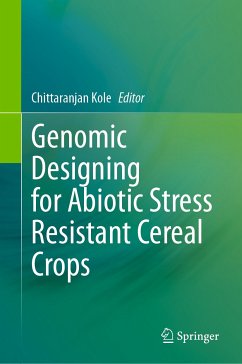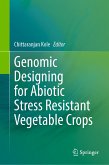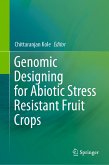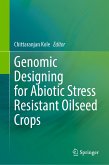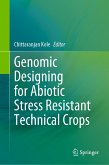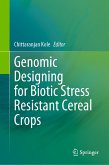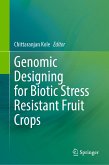This book presents abiotic stresses that cause crop damage in the range of 6-20%. Understanding the interaction of crop plants to the abiotic stresses caused by heat, cold, drought, flooding, submergence, salinity, acidity, etc., is important to develop resistant crop varieties. Knowledge on the advanced genetic and genomic crop improvement strategies including molecular breeding, transgenics, genomic-assisted breeding, and the recently emerging genome editing for developing resistant varieties in cereal crops is imperative for addressing FPNEE (food, health, nutrition, energy, and environment) security. Whole genome sequencing of these crops followed by genotyping-by-sequencing has facilitated precise information about the genes conferring resistance useful for gene discovery, allele mining, and shuttle breeding which in turn opened up the scope for 'designing' crop genomes with resistance to abiotic stresses.
The nine chapters each dedicated to a cereal crop in this volumeare deliberate on different types of abiotic stresses and their effects on and interaction with crop plants; enumerate on the available genetic diversity with regard to abiotic stress resistance among available cultivars; illuminate on the potential gene pools for utilization in interspecific gene transfer; are brief on the classical genetics of stress resistance and traditional breeding for transferring them to their cultivated counterparts; elucidate on the success stories of genetic engineering for developing abiotic stress-resistant crop varieties; discuss on molecular mapping of genes and QTLs underlying stress resistance and their marker-assisted introgression into elite varieties; enunciate on different emerging genomics-aided techniques including genomic selection, allele mining, gene discovery, and gene pyramiding for developing adaptive crop varieties with higher quantity and quality, and also elaborate some case studies on genome editing focusing on specific genes for generating abiotic stress-resistant crops.
The nine chapters each dedicated to a cereal crop in this volumeare deliberate on different types of abiotic stresses and their effects on and interaction with crop plants; enumerate on the available genetic diversity with regard to abiotic stress resistance among available cultivars; illuminate on the potential gene pools for utilization in interspecific gene transfer; are brief on the classical genetics of stress resistance and traditional breeding for transferring them to their cultivated counterparts; elucidate on the success stories of genetic engineering for developing abiotic stress-resistant crop varieties; discuss on molecular mapping of genes and QTLs underlying stress resistance and their marker-assisted introgression into elite varieties; enunciate on different emerging genomics-aided techniques including genomic selection, allele mining, gene discovery, and gene pyramiding for developing adaptive crop varieties with higher quantity and quality, and also elaborate some case studies on genome editing focusing on specific genes for generating abiotic stress-resistant crops.
